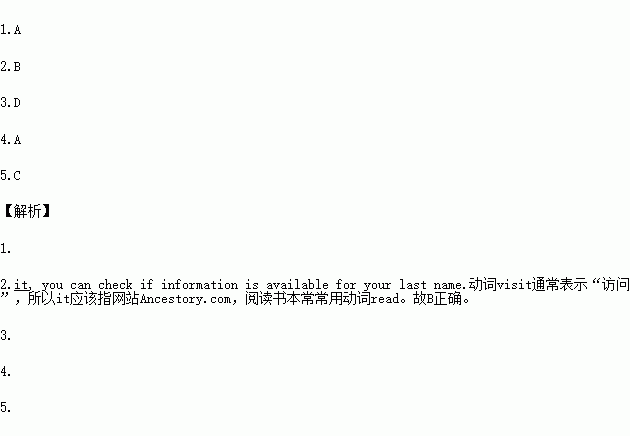题目内容
阅读理解
阅读下列四篇短文,从每小题后所给的A、B、C、D四个选项中,选出最佳选项,并在答题卡上将该选项涂黑。
A family story is like a puzzle. Each family member leaves some clues. Family members come together because they have a common tie with one another, sharing a name and special traditions. Exploring family roots and sharing past memories ensure each tradition lives on.
Ancestory.com has created customized (订做的) “Our Name is History” books to give your family a look into your history by learning about your last name. By visiting it, you can check if information is available for your last name. Ancestory.com researchers have collected more than 5 billion names from records such as passenger lists, immigration records and from birth, marriage and death records. The collected information is then used for each customized book.
“Our Name is History” books are available for nearly 200,000 last names, accounting form 85 percent of all the US homes. The collected information is a great start of learning about your family roots. This book will not only surprise your mother, but also become a precious memory to pass down through the generations. It can also be an inspiration for her to talk about all the special women in her life. So instead of just giving her flowers or jewelry, give her a special family name book and share your favorite memories with her.
After learning the general history of your last name, your might be inspired to continue your exploration. The “Our Name is History” books include a special software product for building, searching and sharing your family history.
To learn more about “Our Name is History” books, visit www. Ournameinhistory.com. The deadline to order in time for Mother’s Day is April 30.
1. The first paragraph mainly talks about _________.
A. the importance of exploring family root
B. what a family story really is
C. the importance of a family name
D. how to pass down a family’s traditions
2.What does the underlined word “it” refer to in Paragraph 2?
A. The “Our Name is History” book.
B. The website Ancestory.com.
C. The website www. ournameinhistory.com.
D. The family’s last name.
3.The “Our Name is History” books _________.
A. are very cheap compared with flowers or jewelry
B. can tell us where we should look to find out family history
C. cover the last names of all Americans
D. can tell us origins of our last names
4.What will mothers do if they get “Our Name is History” books?
A. They may be inspired to talk about some special women they remember.
B. They will collect information about their family roots.
C. They will learn how great their ancestors are.
D. They will share them with some other families.
5. What’s the purpose of the author in writing this passage?
A. To tell us how to explore family roots.
B. To help family traditions to live on.
C. To advertise “Our Name is History” books.
D. To tell us how to create our own family history.

